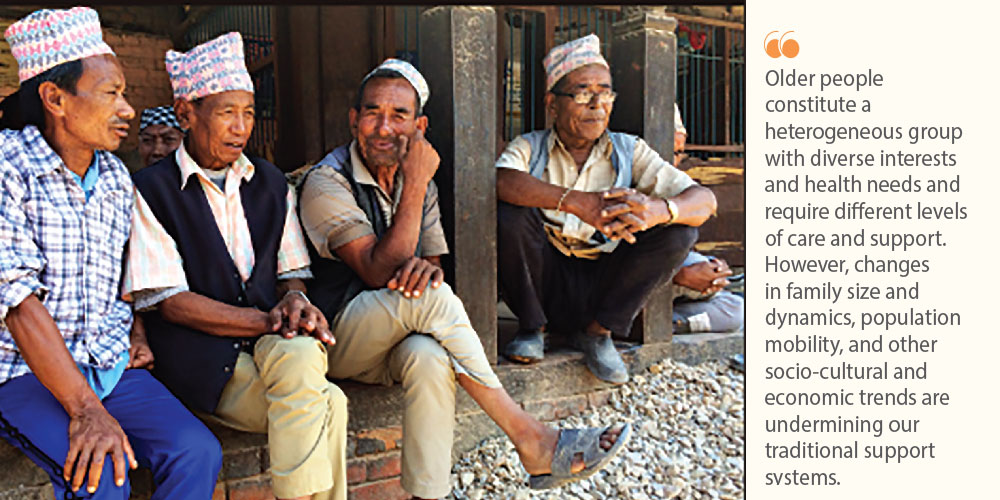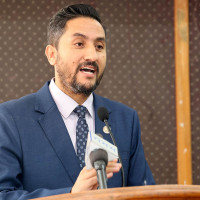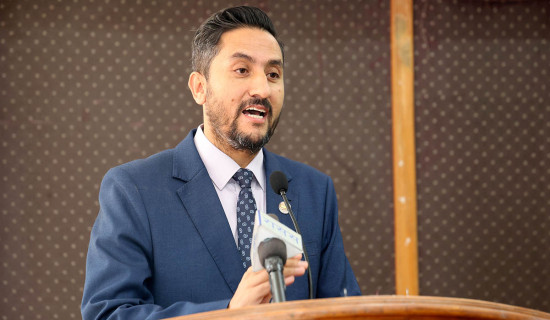- Wednesday, 17 December 2025
Ageing With Dignity
Strengthening Care And Support Systems
The world’s population is still increasing. Obviously, population ageing is a global trend reshaping the landscape of societies worldwide. According to the United Nations, the life expectancy at birth exceeds 75 years in half of the world’s countries, 25 years longer than in 1950. By 2030, older persons are projected to outnumber the youth globally. This increase is more rapid in developing countries. Consequently, the demands for comprehensive health care and social protection services continue to rise substantially for older people in particular.
In 1990, the United Nations designated October 1st as International Day of Older Persons (IDOP). This day is a great celebration for older people that seeks to challenge the way we think about age and promote the development of a world for all ages. This year’s IDOP primarily brings together policymakers, experts, professionals, civil society organisations, networks of older people, human rights activists, and health workers to discuss existing policies, legislation, and practices that strengthen care and support systems for older people.
Moreover, the IDOP 2024 distinctly calls for an urgent need to expand training and educational opportunities in geriatrics and gerontology, address the global shortage of care workers, and recognise the diverse contributions of caregivers. This opportunity calls for all stakeholders to promote care and support systems and underscores the importance of human rights for both carers and care recipients. Equally important is to scale up a person-centred approach to care that respects the dignity, beliefs, needs, and privacy of older people.
From an anthropological perspective, ageing is a biological, interactive, and socioculturally embedded process that occurs globally. In this context, social and behavioural factors such as socio-economic status, life events, and human behaviours and beliefs can have differential effects on the ageing process over time. More importantly, older people have their own life stories and experiences shaped by cultural values, norms, and life course expectations.
In a rapidly ageing and socially changing world, it is fascinating to explore ageing in terms of human evolution. Given the breadth and scope of anthropology of ageing, ethnographic field research would be more useful to explore and better understand how the lives of older people are differently experienced and challenged within and across cultures. In recent years, there has been increasing anthropological interest in exploring the political economy of ageing, intergenerational relations, and mobility in the context of neo-liberal economies and colonial and postcolonial dynamics. Since the 1960s, social gerontology and medical anthropology have started to focus more on the ways health care and modern welfare systems are impacting the lives of older people.
Several social campaigns underscore the ongoing global effort to recognise and safeguard the rights of older people, spotlighting the urgent need to combat ageism and promote an inclusive approach that respects and values the rights and diversity of older people. It is high time to advocate for older people and their meaningful participation and contribution to various spheres of public life. Promoting integration of the rights of older persons into inclusive development policies is instrumental in policy and legal frameworks. Leaving no one behind is an important principle of the United Nations’ Agenda for 2030 Sustainable Development.
Care and support systems for older people are hugely shaped by the social, cultural, and political contexts of ageing. This also constitutes subjective experiences of growing old as well as the emerging role of family members supporting older people. Unfortunately, older people are still marginalised or excluded by societies, and such marginalisation profoundly influences their sustainable livelihoods.
“In the federal context, local governments’ role is crucial to ensuring meaningful engagement of older people in mainstream development. They should mobilise additional resources to promote the older people’s health and dignified lives. But the progress is still minimal,” says Basanta Karki, former President of the National Senior Citizens Fund. He further adds that the old age allowance and other social security provisions are greatly appreciated by senior citizens, but they are concerned with weak implementation in terms of ensuring effective and efficient social protection services for older people who are living in difficult situations such as acute poverty, disability, chronic health status, and poor care and support systems in families.
“Ageing with dignity demands an enabling environment for good care and support systems in societies. Recognition of older people’s contributions to their families and society is absolutely crucial. We want to spotlight the diverse experiences, talents, and contributions of older people and value their participation in local development projects. One of our priorities is to ensure they comfortably receive the care and social protection services in time.” says Raj Kumar Malla, Chairperson of Raksirang rural municipality in Makwanpur.
The role of civil society organisations working at the grass-roots is vital to provide financial, moral, and psychological support to older people who are still facing acute poverty, chronic health problems, and marginalisation in families and communities. “At old age, the first and foremost need is to have easy access to quality health care and good support from families. Yet, this is missing in most of our families as our young children tend to migrate for further studies or work abroad. We feel alone and homeless without them.” says Guru Datta Paudel, 79, who is suffering from hypertension and other medical issues and living in Chandragiri Municipality.
Undoubtedly, rapid population ageing is transforming societies and economies. In this context, the 2024 Asia-Pacific Regional Conference was convened from 11–13 September at the Bali Nusa Dua Convention Centre (BNDCC) in Bali, Indonesia, with an interesting theme of reframing ageing. The conference aimed to provide a wider yet dynamic platform for sharing experiences, learning from innovations, and establishing an effective network among stakeholders from the region and beyond.
“Effective implementation of acts, guidelines, and action plans related to senior citizens is an urgent priority for governments at all levels. Policy discourses are vital to examine ageing from diverse perspectives for envisioning fair and equitable ageing societies,” says Prof. Dr. Prem Sharma, Secretary at the National Senior Citizens Federation. Multi-stakeholder consultations are extremely important to explore the broader issues of older people and intersections with other significant processes such as urbanisation, changing family dynamics, climate change, and technological development that need integrated approaches to sustainable development.
Older people constitute a heterogeneous group with diverse interests and health needs and require different levels of care and support. However, changes in family size and dynamics, population mobility, and other socio-cultural and economic trends are undermining our traditional support systems. Therefore, there are critical needs to enhance the capacity of the local governments, civil society, academia, and private sectors in participatory and inclusive planning for strengthening care and support systems for older people at the community level.
In the health sector, the UN Decade of Healthy Ageing (2021-2030) aims to bring together governments, civil society, international agencies, professionals, academia, the media, and the private sector to improve the lives of older people, their families, and their communities. In most low- and middle-income countries, health care policies and social services targeted at older people are still insufficient. The governments need to focus on innovative initiatives providing quality care and comprehensive support systems for older people. Pro-poor and inclusive public policies are necessary to ensure effective representation and engagement of older people for their safe, healthy, and dignified lives.
(Bhandari is a health policy analyst and has an interest in anthropology.)















